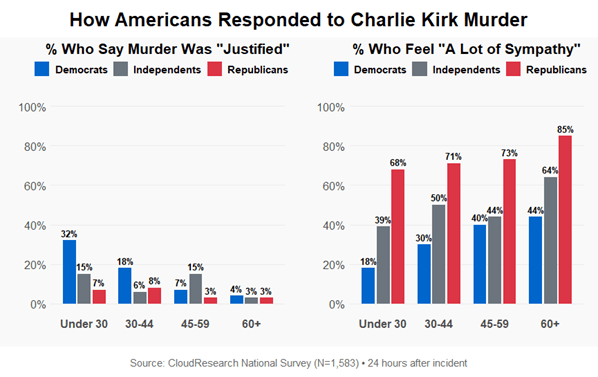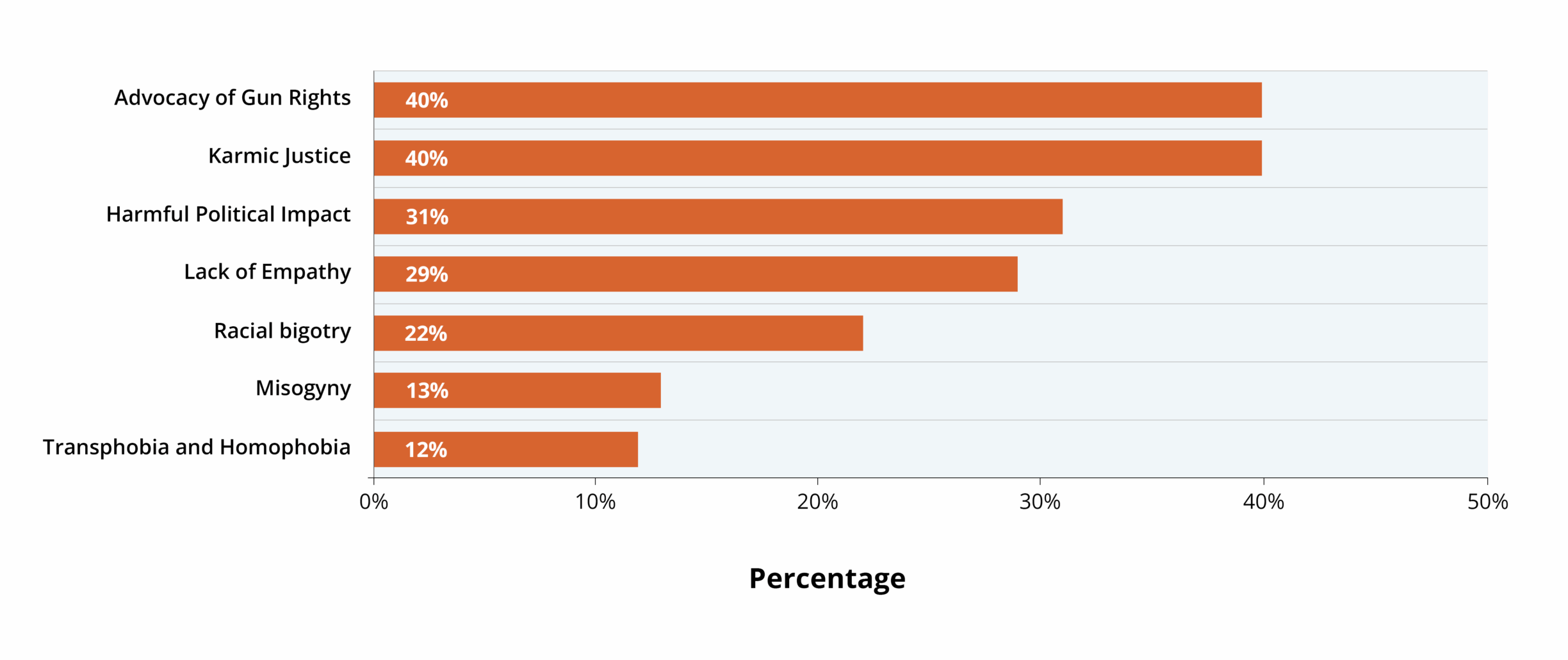
Charlie Kirk, the founder of Turning Point USA, was murdered at an event at Utah Valley University. Kirk was a well-known conservative commentator. He was in Utah as part of his American Comeback Tour. Utah’s governor described his death as a “political assassination.”
To better understand how Americans are reacting to this event, CloudResearch fielded a nationally representative survey of 1,583 respondents within 24 hours of the killing.

To Some, The Murder Was Justified
Overall, 12% of respondents said Kirk’s murder was justified. This rises to 22% among those under 30. Among Democrats, 20% thought that the killing was justified, and among Democrats under 30, nearly one-third (32%) said that the killing was justified. These results point to an undercurrent of support for political violence among younger adults.

Table 1. Percent who thought Charlie Kirk murder was justified, by age and political party.
After respondents shared whether they supported the killing of Charlie Kirk, they were interviewed by Engage, an AI survey and interviewer platform, about why they felt the shooting was or was not justified. The top seven justifications given by those who supported it centered on themes such as Kirk’s advocacy for gun rights, a sense of karmic justice for perceived wrongdoing, his harmful political influence, and a perceived lack of empathy.

Here is an excerpt from a 21-year-old female college student who told Engage:
Engage replied by asking:
Her response:
While these views are alarming, they were not the majority. Most respondents, regardless of politics, expressed sympathy for Kirk and his family.
Sympathy
Only 34% of people under 30 years old said that they had a lot of sympathy for Charlie Kirk.

Table 2. Percent who reported feeling “a lot of sympathy” toward Charlie Kirk by age and political party.
A 55-year-old female told Engage:
Engage replied by asking her:
She responded:
Does the Killing of Charlie Kirk Undermine Respectful Debate?
Beyond individual reactions, many respondents worried about the broader implications for democracy. 57% thought that Charlie Kirk’s murder was likely to “undermine the ability to have a respectful debate in this country.” Interestingly, there was general similarity across age groups and political parties.

Table 3. Percent who thought it was likely that this event will “undermine the ability to have respectful debate in this country”.
One 23-year-old Independent male with a two-year college degree emphasized a growing fear of sharing controversial views due to potential violence:
Engage probed further by asking:
His response:
Is Political Violence Now Accepted in the US?
We also probed whether Charlie Kirk’s murder was seen as part of a larger trend. 33% of respondents said the country has “reached a tipping point where political violence is now acceptable in the U.S.”

Table 4. Percent who agreed “we’ve reached a tipping point where political violence is now acceptable in the US”.
While many were alarmed by recent trends of political violence normalization, there remains a robust constituency advocating for non-violence and adherence to democratic principles, emphasizing the dynamic and highly polarized nature of this issue in contemporary American society.
This was supported by one somewhat encouraging finding that only 3% of the respondents were willing to admit that they were “okay with political violence against those” they disagree with. It is perhaps noteworthy that nobody over the age of 60 agreed with this statement compared to about 5% of those under the age of 45.

Table 5. Percent who agreed with the statement: “I am okay with political violence against those I disagree with”.
About CloudResearch
CloudResearch is an online platform that connects researchers with more than 100 million research participants worldwide. CloudResearch provides tools to carry out complex online projects and polls for the academic, public, and private sectors. Engage is CloudResearch’s latest research innovation, using AI to combine the power of traditional and conversational surveys at scale. Engage® is protected by U.S. Patents Nos. 12,243,066; 12,254,873; and 12,314,969 B1, granted in 2025.















